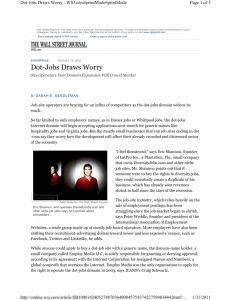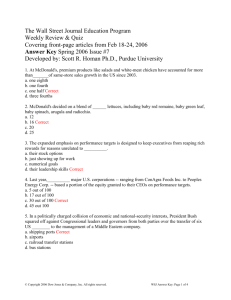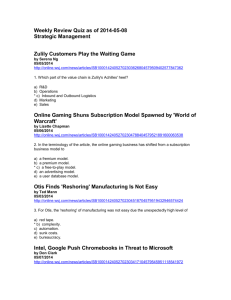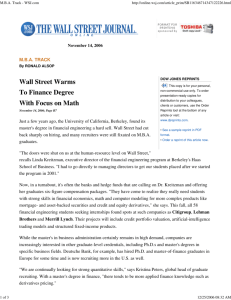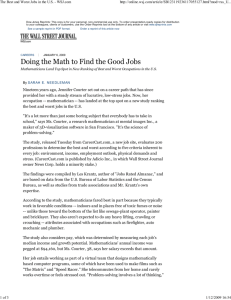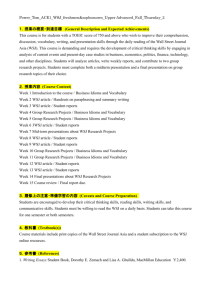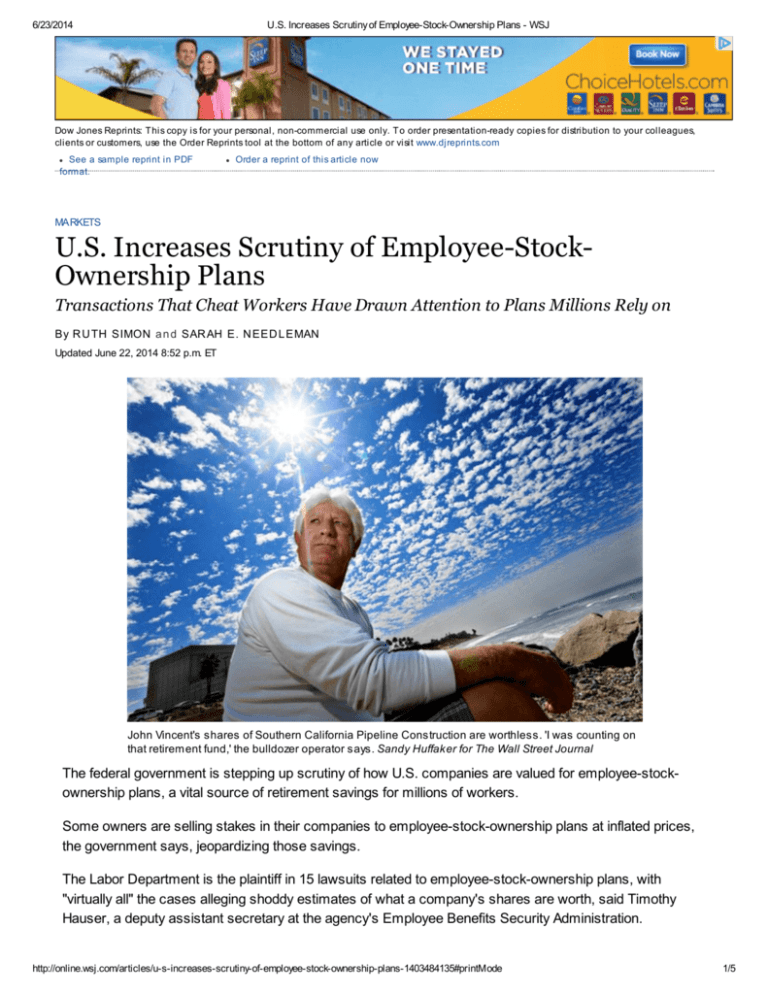
6/23/2014
U.S. Increases Scrutiny of Employee-Stock-Ownership Plans - WSJ
Dow Jones Reprints: This copy is for your personal, non-commercial use only. To order presentation-ready copies for distribution to your colleagues,
clients or customers, use the Order Reprints tool at the bottom of any article or visit www.djreprints.com
See a sample reprint in PDF
format.
Order a reprint of this article now
MARKETS
U.S. Increases Scrutiny of Employee-StockOwnership Plans
Transactions That Cheat Workers Have Drawn Attention to Plans Millions Rely on
By R U TH SIMON a n d SAR AH E. N EED L EMAN
Updated June 22, 2014 8:52 p.m. ET
John Vincent's shares of Southern California Pipeline Construction are worthless. 'I was counting on
that retirement fund,' the bulldozer operator says. Sandy Huffaker for The Wall Street Journal
The federal government is stepping up scrutiny of how U.S. companies are valued for employee-stockownership plans, a vital source of retirement savings for millions of workers.
Some owners are selling stakes in their companies to employee-stock-ownership plans at inflated prices,
the government says, jeopardizing those savings.
The Labor Department is the plaintiff in 15 lawsuits related to employee-stock-ownership plans, with
"virtually all" the cases alleging shoddy estimates of what a company's shares are worth, said Timothy
Hauser, a deputy assistant secretary at the agency's Employee Benefits Security Administration.
http://online.wsj.com/articles/u-s-increases-scrutiny-of-employee-stock-ownership-plans-1403484135#printMode
1/5
6/23/2014
U.S. Increases Scrutiny of Employee-Stock-Ownership Plans - WSJ
Related
Performance of Employee Stock Plans Is
Tough to Gauge
Trachte Building Systems Case Shows How
Plans Can Go Awry
"Valuation is the first, second, third and fourth problem," Mr.
Hauser said. In March, Labor Secretary Thomas Perez told
lawmakers that some appraisals "have been deliberately
inflated," comparing them to real-estate-bubble-era home
appraisals that "masterfully came in at what you needed."
Frank Brown, a managing director at valuation firm Willamette Management Associates who testifies for
companies and workers in stock-plan-related cases, said the number of lawsuits has "gone up
substantially."
Since the start of fiscal 2010, the Labor Department has recovered over $241 million through suits or
investigations that were resolved without going to court, nearly all of which involve valuations. Overall, the
agency has filed 28 suits tied to employee-stock-ownership plans since October 2009, double the total in
the previous six years, according to an internal tally reviewed by The Wall Street Journal.
Related Documents
Read a transcript of a 2007 meeting in w hich
employees of Trachte Building Systems Inc. w ere told
the terms of the company's sale to Alliance Holdings
Inc. and federal court rulings in the case.
Federal officials are expected to propose early next year
rules aimed at toughening standards for outside appraisers
who provide valuations for employee-stock-ownership plans.
Now, appraisers must be hired whenever a stock plan is
started and must tell workers once a year how much their
shares are worth, but there are no minimum qualification
standards for these appraisers or specific rules on how to
perform their work.
The agency also is getting tougher on trustees who work on
behalf of employee-stock-ownership plans—and have a
fiduciary duty to put the interests of workers first or face
financial liability if things go wrong.
A settlement earlier this month with GreatBanc Trust Co.
included a set of required practices that the government hopes will be followed by other trustees. These
include taking "reasonable steps" to insure the appraiser is receiving accurate and current information. It
must also "prudently investigate" the appraiser's qualifications. "Others in the industry would do well to take
notice of the protections put in place by this agreement," said Phyllis C. Borzi, an assistant Labor
secretary.
GreatBanc, based in Lisle, Ill., agreed to pay about $5.3 million to resolve allegations that the firm let Sierra
Aluminum Co.'s employee-stock-ownership plan buy shares for more than they were worth. GreatBanc
pledged to abide by "the policies and procedures" outlined in the pact whenever the firm is a trustee or
"other fiduciary" of such a stock plan.
GreatBanc neither admitted nor denied the allegations. In a statement, the company said the settlement
was "a product of constructive and collaborative discussions" with the Labor Department. A Sierra
spokesman declined to comment.
http://online.wsj.com/articles/u-s-increases-scrutiny-of-employee-stock-ownership-plans-1403484135#printMode
2/5
6/23/2014
U.S. Increases Scrutiny of Employee-Stock-Ownership Plans - WSJ
Some industry officials say the government is overreacting. "Are there thousands of American workers that
are getting harmed and hurt by a significant number of flimflam ESOPs? I don't see it," said J. Michael
Keeling, president of the ESOP Association, an advocacy group for companies with employee-stockownership plans.
Corey Rosen, founder of the National Center for Employee Ownership, a research group with members
that include companies with employee-stock-ownership plans and firms that pitch services to these
companies, said there are "people who use" such plans "badly." Overall, though, "the opponents of ESOPs
have no data," he adds, "just impressions and anecdotes."
About 6,800 U.S. companies had employee-stock-ownership plans as of 2011, the latest year for which
data are available, according to the Labor Department. At about a third of those companies, the stock plan
is the only retirement benefit, while other companies also offer a 401(k) plan or other perks. There is usually
a long menu of investment options in 401(k) plans, which can include the company's own publicly traded
shares.
In employee-stock-ownership plans, a trust is created, with the company sometimes contributing shares or
cash so the trust can buy the company stock. Alternatively, the shares are bought using a bank loan or a
loan from the seller.
More than 13.4 million workers were part of an employee-stock-ownership plan in 2011, up 7.5% since
2006. The plans have amassed combined assets of $940 billion. In comparison, more than 74 million
Americans had a 401(k) at the end of 2013, adding up to about $4 trillion in assets, according to the
Employee Benefit Research Institute.
Company owners often can defer taxes on capital gains from the sale of all or part of the firm to an
employee-stock-ownership plan, and employer contributions to such plans generally are tax-deductible.
Congressional researchers estimated that the tax benefits totaled $1.1 billion last year.
Workers can start moving a portion of their holdings into other investments when they turn 55 years old and
http://online.wsj.com/articles/u-s-increases-scrutiny-of-employee-stock-ownership-plans-1403484135#printMode
3/5
6/23/2014
U.S. Increases Scrutiny of Employee-Stock-Ownership Plans - WSJ
have been in their employee-stock-ownership plan for at least 10 years. For millions of Americans, such
plans have provided a welcome nest egg. Tim Lybeck Sr., 71 years old, says he left Carris Reels Inc. in
2009 with $80,000 from the stock plan formed by the maker of spools for the wire and cable industries,
based in Proctor, Vt.
Unlike a 401(k), contributions to an employee stock plan generally aren't deducted from a worker's
paycheck, though companies may offer ESOPs in lieu of other benefits. "It didn't cost me a cent," said Mr.
Lybeck, a retired truck driver.
In contrast, when the owners of People Care Holdings Inc. sold the home-health-care provider to
employees in 2008, the shares were valued at about $8 apiece. By the end of 2012, the stock was worth
just nine cents a share. "I thought it would be more," said 61-year-old employee Norva Morris-Lewis, who
earns $10 an hour and has no other retirement savings.
The Labor Department accused the owners, who cashed out in the $80 million deal by creating an
employee-stock-ownership plan, of keeping secret the bad news that People Care had lost a big contract.
Employees sued GreatBanc, the firm hired to evaluate the sale on their behalf, claiming it "breached its
duties" by "failing to conduct a thorough and independent review."
Walter Yurkanin, GreatBanc's chief legal officer, said the firm "believes it fulfilled its fiduciary duty and didn't
do anything wrong." In January, People Care's former owners agreed to pay $10 million to settle the Labor
Department's investigation, without admitting or denying wrongdoing. A company spokesman said the
valuation "complied in all respects with all legal requirements." The lawsuit filed by employees against
GreatBanc still is pending.
To protect employees, a stock plan's trustees are required to turn to an outside appraiser when assessing
the company's value and stock price if the shares aren't widely traded. Because more than 95% of
companies with an employee-stock-ownership plan are closely held, appraisers often rely heavily on
company management for information. That can lead to trouble.
In 2007, Joel and Linda Spear decided to sell Southern California Pipeline Construction Inc. to workers. The
stock plan's appraiser said the Tustin, Calif., water-, sewer- and storm-drain-system installer was worth
about $20 million.
The couple then asked for a new appraisal from a different firm, according to a lawsuit filed by a bank that
later became the stock plan's trustee. The second appraisal came in at $35 million, citing higher revenue
projections provided by the couple. This resulted in a higher sales price and a larger debt load for the
ESOP to finance the purchase, according to court filings.
Bulldozer operator John Vincent got 18,500 shares of company stock, once valued at roughly $65,000.
Soon after the sale was completed, the company cut its revenue projections by roughly 50%, according to
court filings. The company shut down in 2010. Its shares are worthless.
"I was counting on that retirement fund," said Mr. Vincent, 63, who earned $27 an hour but who got laid off
from the company shortly before it collapsed, then suffered a stroke in 2011.
Without admitting or denying wrongdoing, Mrs. Spear and the stock plan's two former trustees paid more
than $5 million to settle a class-action suit, with proceeds distributed to Mr. Vincent and other employees.
"We believe the valuation was accurate at the time it was prepared," said her lawyer, Brad Huss.
http://online.wsj.com/articles/u-s-increases-scrutiny-of-employee-stock-ownership-plans-1403484135#printMode
4/5
6/23/2014
U.S. Increases Scrutiny of Employee-Stock-Ownership Plans - WSJ
Write to Ruth Simon at ruth.simon@wsj.com and Sarah E. Needleman at sarah.needleman@wsj.com
Copyright 2013 Dow Jones & Company, Inc. All Rights Reserved
This copy is for your personal, non-commercial use only. Distribution and use of this material are governed by our Subscriber Agreement and by
copyright law. For non-personal use or to order multiple copies, please contact Dow Jones Reprints at 1-800-843-0008 or visit
www.djreprints.com
http://online.wsj.com/articles/u-s-increases-scrutiny-of-employee-stock-ownership-plans-1403484135#printMode
5/5


